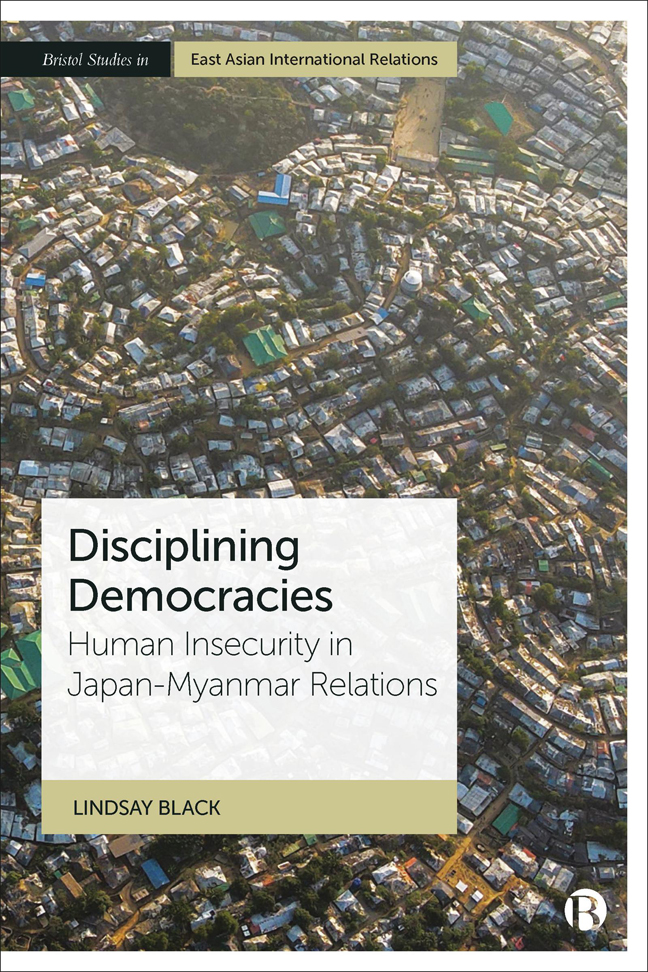Book contents
- Frontmatter
- Dedication
- Contents
- List of Abbreviations
- Acknowledgements
- Introduction
- 1 The Evolution of New Area Studies
- 2 ‘Asia's Liberal Leader’ and Human Insecurity
- 3 Japan as a ‘Bridge’: Facilitating Myanmar's Transition to a ‘Disciplined Democracy’
- 4 Japan and Special Economic Zones in Myanmar
- 5 Meddling for Profit: Japan's Peace-building Role in Myanmar
- 6 Dereliction of Responsibility: Japan's ‘Liberal Leadership’ in the 2016–20 Rakhine Crisis
- Conclusion: The Chimera of Progress
- Notes
- References
- Index
2 - ‘Asia's Liberal Leader’ and Human Insecurity
Published online by Cambridge University Press: 25 January 2024
- Frontmatter
- Dedication
- Contents
- List of Abbreviations
- Acknowledgements
- Introduction
- 1 The Evolution of New Area Studies
- 2 ‘Asia's Liberal Leader’ and Human Insecurity
- 3 Japan as a ‘Bridge’: Facilitating Myanmar's Transition to a ‘Disciplined Democracy’
- 4 Japan and Special Economic Zones in Myanmar
- 5 Meddling for Profit: Japan's Peace-building Role in Myanmar
- 6 Dereliction of Responsibility: Japan's ‘Liberal Leadership’ in the 2016–20 Rakhine Crisis
- Conclusion: The Chimera of Progress
- Notes
- References
- Index
Summary
Introduction
In late May 2019, the Lowy Institute, a leading Australian think tank on global politics, declared Japan to be the leader of the liberal international order in Asia, hailing Prime Minister Abe Shinzō's commitment to multilateral forums and establishing regional standards, notably on trade (Johnson, 2019). This view has been echoed by academics and media commentators in both Asia (Chang, 2021; Hosoya, 2021) and the US (Ikenberry, 2017; Hornung, 2018). These sources maintain that Donald Trump's ascendancy to the office of US president undermined a liberal international order that was already in crisis due to the Lehman shock of 2008, economic inequality and growing populism around the world (Ikenberry, 2017; Chang, 2021). With the US relinquishing the leadership of the liberal international order, it now fell upon Japan's Abe Shinzō and Germany's Angela Merkel to have the conviction to lead (Ikenberry, 2017). For some, Abe more than met expectations on trade by making Japan the ‘pivotal state’ in the establishment of the Comprehensive and Progressive Transpacific Partnership (Solís and Katada, 2015), following Trump's withdrawal from its predecessor, the Trans-Pacific Partnership, as well as finalizing the EU-Japan Economic Partnership Agreement. For Katada (2020), Japan's regional leadership extended beyond trade to include multilateral financial ties and development assistance. In terms of maintaining regional security, others champion the passage of the 2015 security legislation by the Abe administration, enabling Japan's SDF to participate in collective self-defence, enhanced bilateral security ties, and Abe's promotion of liberal values in the face of China's illiberal rise (Chang, 2021; Solís, 2021).
The Abe administration capitalized on its designation as ‘Asia's liberal leader’ by promoting a ‘values-based diplomacy’ (kachikan gaikō) that emphasized ‘universal values’, ‘free and open order’, ‘connectivity’, ‘thought leadership’ and ‘bridge-building’ (kakehashi), including in Japan's FOIP strategy (Jimbo, 2018). As Asia's first democracy and developed state, Japanese policy makers have long perceived their country as having a unique regional role. As an ‘in-between state’ that straddles both East and West, Japan can act as a ‘thought leader’ and mentor to developing and democratizing Asian states.
- Type
- Chapter
- Information
- Disciplining DemocraciesHuman Insecurity in Japan-Myanmar Relations, pp. 34 - 58Publisher: Bristol University PressPrint publication year: 2023



